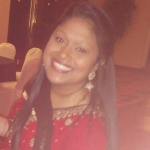
by Subrina Singh – Follow @Subrinalalala
I grew up in a family where each day I was reminded of the “American Dream” and heard stories of the “thirst” and the “drive” my parents had to be successful in the United States. My parents come from the West Indies. My father is from Guyana and my mother is a first-generation Trinidadian; both my paternal and maternal grandparents migrated from India in the early 1900s.
For years, my dad explained to me that our ancestors left India in hope of a better life and greater opportunities for their children. It is for those same reasons, my parents chose to leave Guyana and Trinidad. Their drive and desire to succeed in the United States is a kind of “thirst” I have come to accept I will never understand. As my dad would say, I have been blessed to be born with a “gold spoon in my mouth.”
My parents worked extremely hard from the moment they arrived in New York. They had hopes and dreams for a better life and at times, that dream seemed unattainable but they never lost hope. To this day, my parents are the most hardworking people I have ever met. I have worked hard in school; I graduated from high school, college and finally graduate school but these accomplishments seem minute compared to creating a home, a business and raising a family in a country that is not my own.
[Read Related: Why it’s Important for Every Immigrant to Make Sense of Their Story]
I am forever grateful for the life my parents have created for me. I am grateful for the risks they took to afford me the opportunities to reach my fullest potential. But most of all, I am grateful for their courage and bravery to move to a new country, assimilate to a new culture and create a better life full of opportunity for their family. Because of their belief in the American Dream, I have lived a privileged life. Every opportunity I have had in my life is because of their hope and faith in the “land of opportunity.”
We do belong here. Opportunities are not a privilege for the rich or the white. That’s the beauty of America — opportunity is a right this land offers. My family has worked hard to earn that right. Despite their religion, skin color or race, my parents have been able to succeed in this great nation because of opportunity and privilege in which the United States offers.
Without that, there is no American Dream. Saying “Make America Great Again” is insulting. It’s insulting to the immigrants who have worked hard in this country to attain the American Dream — the United States is great because that dream is achievable to so many. To take away the rights of immigrants’ opportunities to achieve the American Dream is taking away the Greatness this land offers. We do belong here, because we make America great.
[su_divider]
 Subrina Singh is a passionate young writer. After completing her degree in all things Indian at Stony Brook University, she is now pursuing her Master’s Degree at Columbia University. More recently, she has become committed to using her experience with mental illness to help better the mental-health awareness within the South Asian community. Subrina enjoys writing, reading and drinking Starbuck’s Passion Tea Lemonade while singing Bollywood hits of the Golden Era. Follow Subrina on Twitter for her reactions to Pretty Little Liars every Tuesday night!
Subrina Singh is a passionate young writer. After completing her degree in all things Indian at Stony Brook University, she is now pursuing her Master’s Degree at Columbia University. More recently, she has become committed to using her experience with mental illness to help better the mental-health awareness within the South Asian community. Subrina enjoys writing, reading and drinking Starbuck’s Passion Tea Lemonade while singing Bollywood hits of the Golden Era. Follow Subrina on Twitter for her reactions to Pretty Little Liars every Tuesday night!




